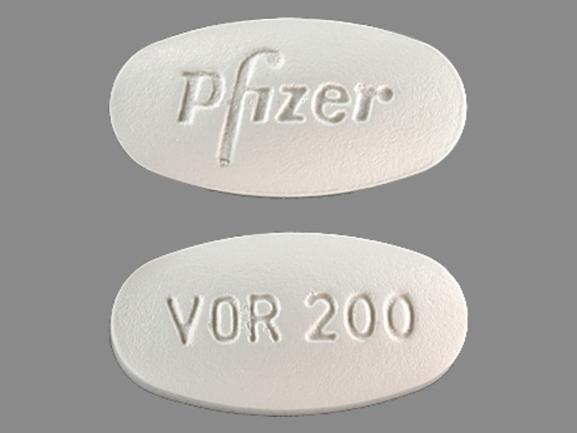Vfend Disease Interactions
There are 6 disease interactions with Vfend (voriconazole).
- QT prolongation
- Electrolyte disturbances
- Galactose intolerance
- Hepatotoxicity
- Renal dysfunction
- Risk of pancreatitis
Azole antifungals (applies to Vfend) QT prolongation
Moderate Potential Hazard, Moderate plausibility. Applicable conditions: Arrhythmias, Cardiomyopathy
Some azole antifungals have been associated with prolongation of the QT interval on the ECG. Rare cases of QT prolongation and torsade de pointes have been reported during postmarketing experience; such reports usually involved seriously ill patients with multiple confounding risk factors, such as structural heart disease, electrolyte abnormalities, and concomitant medications. These drugs should be administered with caution to patients with potentially proarrhythmic conditions, such as congenital/acquired QT prolongation, cardiomyopathy (especially when heart failure is present), sinus bradycardia, and existing symptomatic arrhythmias. Concomitant use with other medications that have potential to increase the risk of cardiotoxicity should be avoided.
Voriconazole (applies to Vfend) electrolyte disturbances
Moderate Potential Hazard, Moderate plausibility. Applicable conditions: Electrolyte Abnormalities
Electrolyte disturbances (such as hypokalemia, hypomagnesemia, and hypocalcemia) should be monitored and corrected before and during voriconazole therapy.
Voriconazole (applies to Vfend) galactose intolerance
Moderate Potential Hazard, Moderate plausibility. Applicable conditions: Galactosemia
Voriconazole tablets contain lactose and should not be given to patients with galactose intolerance, total lactase deficiency, or glucose-galactose malabsorption. Voriconazole oral suspension contains sucrose.
Voriconazole (applies to Vfend) hepatotoxicity
Moderate Potential Hazard, Moderate plausibility. Applicable conditions: Liver Disease, Myeloproliferative Disorder
Serious hepatic reactions (including clinical hepatitis, cholestasis, fulminant hepatic failure [including fatalities]) have been reported infrequently during voriconazole therapy. Hepatic reactions have primarily occurred in patients with serious underlying medical conditions (mainly hematological malignancy). Serum transaminase levels and bilirubin should be measured at the start of and during voriconazole therapy, according to the manufacturer product information.
Voriconazole is primarily metabolized by the liver and has been shown to accumulate significantly in patients with impaired hepatic function. Adult patients with baseline liver function tests (ALT, AST) of up to 5 times the upper limit of normal do not require dose adjustments; however, liver function tests should continue to be monitored for further elevations. The manufacturer recommends that the maintenance dose be halved in adult patients with mild to moderate liver dysfunction/cirrhosis (Child-Pugh A and B). Voriconazole has not been studied in adult patients with severe liver dysfunction/cirrhosis (Child-Pugh C) or in patients with chronic hepatitis B or C; no dosing recommendations are available for patients with severe liver dysfunction. Voriconazole should only be used in patients with severe liver dysfunction if the benefit outweighs the potential risk. Patients with liver dysfunction must be carefully monitored for drug toxicity. Dosage adjustment has not been established in pediatric patients with liver dysfunction.
Voriconazole (applies to Vfend) renal dysfunction
Moderate Potential Hazard, Moderate plausibility.
The pharmacokinetics of voriconazole are not significantly altered by impaired renal function. However, accumulation of the IV vehicle, sulfobutyl ether beta-cyclodextrin sodium (SBECD), occurs in patients with moderate or severe renal dysfunction (CrCl less than 50 mL/min). The mean systemic exposure (AUC) and Cmax of SBECD were increased 4-fold and almost 50%, respectively, in moderately impaired patients compared to controls with normal renal function. The manufacturer recommends that oral voriconazole be used in patients with moderate to severe renal dysfunction, unless after assessing the benefit/risk to the patient, use of IV voriconazole is justified; serum creatinine levels should be monitored closely in these patients, and if increases occur, switching to oral voriconazole should be considered. No dosage adjustment is necessary when using oral voriconazole. Monitoring of renal function (including laboratory evaluation of serum creatinine) is recommended. Dosage adjustment has not been established in pediatric patients with renal dysfunction.
Voriconazole (applies to Vfend) risk of pancreatitis
Moderate Potential Hazard, Moderate plausibility. Applicable conditions: Bone Marrow Transplantation
Patients with risk factors for acute pancreatitis (e.g., recent chemotherapy, hematopoietic stem cell transplantation) should be monitored for the development of pancreatitis during voriconazole therapy.
Switch to professional interaction data
Vfend drug interactions
There are 691 drug interactions with Vfend (voriconazole).
Vfend alcohol/food interactions
There is 1 alcohol/food interaction with Vfend (voriconazole).
More about Vfend (voriconazole)
- Vfend consumer information
- Check interactions
- Compare alternatives
- Pricing & coupons
- Reviews (3)
- Drug images
- Side effects
- Dosage information
- During pregnancy
- Generic availability
- Drug class: azole antifungals
- Breastfeeding
- En español
Related treatment guides
Drug Interaction Classification
| Highly clinically significant. Avoid combinations; the risk of the interaction outweighs the benefit. | |
| Moderately clinically significant. Usually avoid combinations; use it only under special circumstances. | |
| Minimally clinically significant. Minimize risk; assess risk and consider an alternative drug, take steps to circumvent the interaction risk and/or institute a monitoring plan. | |
| No interaction information available. |
See also:
Further information
Always consult your healthcare provider to ensure the information displayed on this page applies to your personal circumstances.


